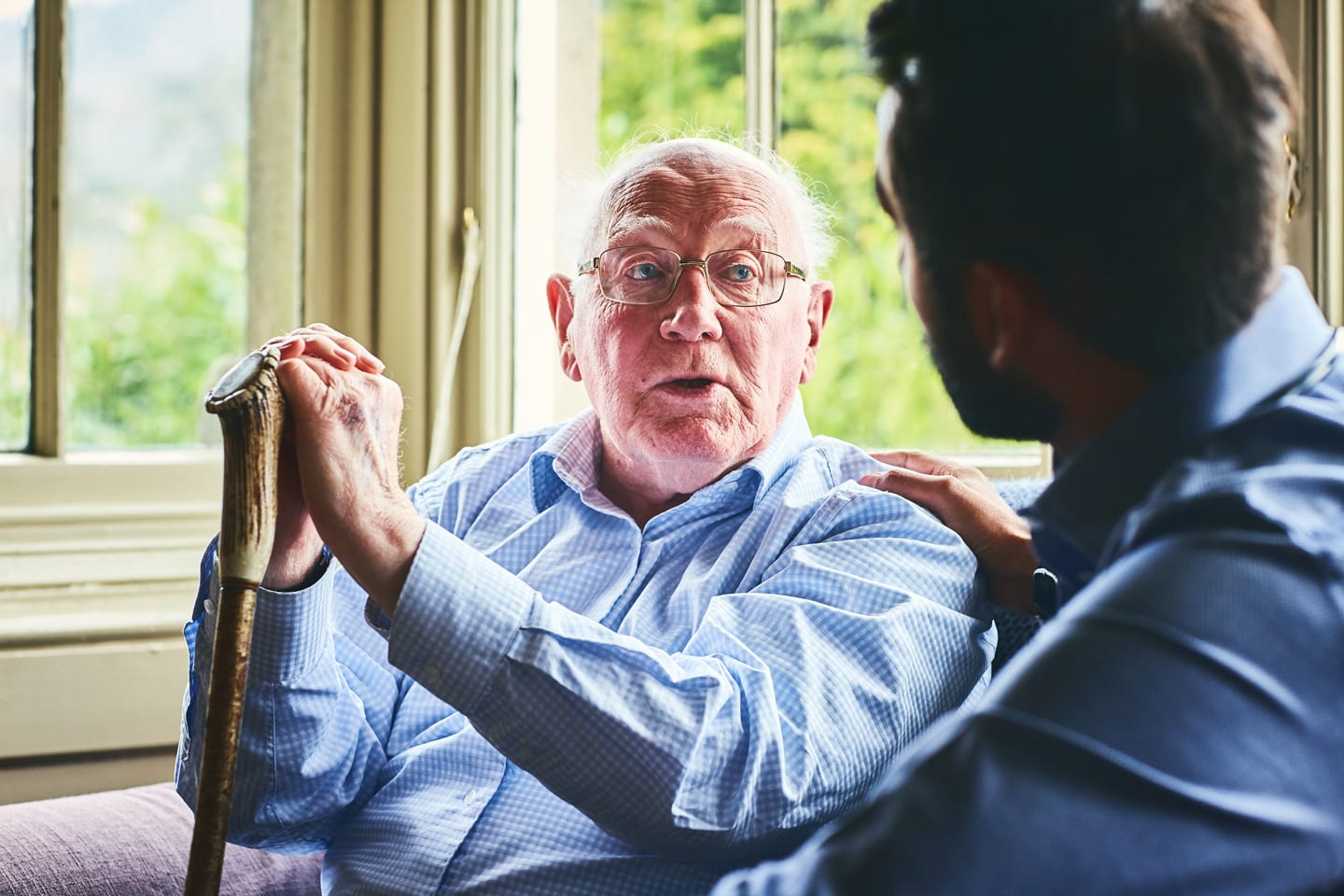Adapting to life with dementia
Some carers of people with dementia have told us that following diagnosis they felt a range of emotions such as hopelessness, shock and relief and did not know what to expect. Sometimes doctors did not talk about how their lives might change when supporting someone living with dementia and what they could do to manage changes – in the person, in relationships and how to manage feelings as a carer.
This website will help you move forward with adapting to life with dementia.
Many carers tell us that despite the challenges they have faced, life with dementia can be meaningful and rewarding.
People living with dementia and carers have found different ways to adapt to life with dementia, such as:
- Talking to other people with similar experiences to find ways to come to terms with the diagnosis
- Focussing on what is most important in your life, such as spending time with the people you love or visiting places that are important to you
- Focussing on what the person can still do, rather than what they find difficult
- Taking care of your own health and wellbeing by rediscovering old hobbies, or trying new activities to provide a sense of achievement or contentment
- Taking part in research, to help others now and in the future
- Becoming a dementia advocate and speaking out about the rights of people with dementia and carers.
For some people, finding hope happened over time, and others made a conscious decision to be hopeful living with dementia. Finding hope can help you to live in the present and also to plan for the future.
Dementia is a long-term condition which can affect memory, language, problem-solving and other thinking abilities. The affects of dementia on daily life are likely to get worse over time Planning helps deal with the uncertainty of the future.
This Forward with dementia website includes information to help you maintain and adapt your life. Read more about Coming to terms with dementia, Managing symptoms and changes and Supporting health and wellbeing. Through using Action points we encourage you to explore and prepare for changes in your life and to help you and the person you support with Making Plans and Decisions.

Start your own dementia toolkit
Myths and stereotypes about dementia
Many carers feel negative, ashamed or even embarrassed about dementia and how it can affect the person they support. This is called stigma. In contrast, people with other common long-term diseases like asthma or heart disease are less likely to feel ashamed. These negative views often come from common myths and stereotypes about dementia. You may have come across these through television, books, films, the news and in listening to others.
Let’s bust some of these myths and stereotypes.
Myth 1: People with dementia are victims suffering from the disease
Fact 1: Many people with dementia have control, are comfortable, content, even happy
The common myth about people with dementia is they are victims at the end of their lives suffering from a brain disease that robs them of their memories, identity and life. People with dementia are often shown on television, in books and described in the news as powerless, and dependent.
This is not true. While people with dementia do have a brain disease, and may have problems with memory and concentration, they know who they are and you can live well for many years with dementia. Many people with dementia do a lot for themselves and for others and are in control of their lives, even if they get help for some tasks. Importantly the ability to experience joy, sadness and other emotions does not stop with dementia.
Unfortunately, many people (including doctors and other health care professionals) may also have these unhelpful stereotypes of dementia. This means doctors and other professionals might speak to you, the carer, directly and treat the person with dementia as if they can’t understand or make decisions. This can be uncomfortable for you and undermine the person you support. If this happens, ask doctors and other professionals to treat the person you support as they would other patients. Although people with dementia may need information in different ways like broken down into manageable chunks, they have the right to be fully informed and to make choices about their treatments and support. Managing how others treat you, and the person you support.
Myth 2: Carers suffer from ’relentless burden’
Fact 2: Supporting for a person with dementia can be hard, but with planning and support it can be manageable, and even rewarding
You may not think of yourself as a ‘carer’ You may think of yourself simply as a partner, son, niece, friend or some other relation. Sometimes people see caring as their duty or maybe a chance to return the care and support they had from the person with dementia in the past. Whatever your views on helping, supporting and caring; supporting a person with dementia can be difficult and tiring at times. Some types of dementia and different symptoms can be more difficult to manage than others Information about the dementia diagnosis will help you move forward. If possible, getting help from others, such as family, friends and services soon after diagnosis can help you to take breaks from caring. However, although support from family and friends is helpful, getting health and social services in place as soon as possible after diagnosis is essential. See Planning services for support.
Relationships are rarely perfect. Some common relationship difficulties can make supporting someone with dementia more challenging. This might be marriages or partnerships later in life, long-term relationship difficulties, a history of alcohol or drug dependency or isolation from support systems. Dementia can cause personality changes or behavioural problems which can be difficult to cope with. Talking about these with your doctor and asking for referral to specialist counselling can help you make decisions in the best interest for both you and the person with dementia.
Myth 3: People with dementia cannot learn new skills
Fact 3: People with dementia continue to learn!
People with dementia often have problems with their short-term memory. This means they find it difficult to remember things that happened recently. It can take longer and requires more effort for people with dementia to learn new things. For instance, many people with dementia learned to use zoom along with everyone else during the COVID-19 pandemic. Chris Higgins talks about his experience of using Zoom to stay connected with others. Read about his experiences here.
However, it may be stressful and frustrating for the person you support to learn something new; and stressful for you to teach them. Some people with dementia find it’s frustrating and sometimes avoid learning situations or changes to routines. Take a step back and encourage the person to take their time, use pencil and paper for notes. Someone else may be able to support you both, such as a family member, friend or specialist nurse.
Myth 4: Nothing can be done for people with dementia
Fact 4: There are many treatments and strategies that can slow progression and help with symptoms
It is true there is currently no cure for dementia. The same is true for many other long-term diseases too such as diabetes and multiple sclerosis. However, there are medications, therapies and things you can do to help in your daily life. For more information on these, read about treatments and therapies for dementia Dealing with memory, thinking and perception difficulties.
Learn from people with dementia and carers living meaningful lives
For many people, meeting others living with dementia and their carers became a turning point. They realise the person living with dementia and their carer are normal, regular people who continued living their life and adapting to the ups and downs of dementia. Dementia can be challenging and speaking and listening with others who have been through or who are going through similar experiences can be a really useful tool. Meeting and talking with other people with similar experiences may help you to feel less alone. Hearing how others have adapted and moved forward can give you a sense of hope.
Other ways to ‘meet’ people living meaningful lives with dementia:
- Explore stories where other carers and people with dementia share their experiences of life with dementia. Find out about people’s experiences at Healthtalk.
- Read blogs written by people with dementia
Dementia Alliance International blogs
Which me am I today
Living with dementia and comorbidities
Dementia Diaries - Visit Dementia Talking Point. They have a group for carers to share their thoughts, feelings and experiences of life with dementia.
- Find out about local support groups through the Alzheimer’s Society and other organisations such as Young Dementia UK and Age UK.
- Join a virtual carers group such as Dementia Carers.
- Ask your doctor, practice nurse or specialist nurse about carer support groups in your area.






